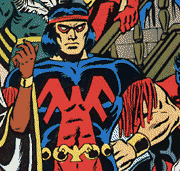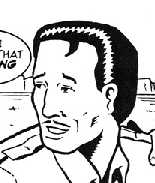

With violence headlining the news around the globe, a multicultural perspective has never been more relevant than now. No longer does "rugged individualism" or "might makes right" seem the answer to every dilemma. Even jaded Americans, sure of their own superiority, are beginning to ask what's happening.
Unfortunately, the frontier mentality is embedded deeply in the American psyche. It's pervasive in every form of popular entertainment, from sports to TV to comic books. How many times has the lone hero, a John Wayne or James Bond, defeated the forces of evil against insurmountable odds?
By providing another perspective, multicultural products challenge our predominant myths. But it's difficult to find such voices in today's media onslaught. Few minority creators have the resources to break through the noise.
As the smallest and most at-risk minority, Native Americans provide a case study of how mainstream society ignores other viewpoints. As an indigenous people with non-Western roots, they also suggest an antidote to our monocultural beliefs.
Racism here and now
Most people consider blatant racism a thing of the past. But as the 21st century dawns, minority stereotyping and slighting still occur too often. A few recent examples:

One might dismiss these as isolated cases, but they don't begin to plumb the depths of our cultural myopia. More telling are the themes and attitudes evident in much of our media. These reflect a mindset we rarely even notice, much less question.
Comics mirror society
American comic books and cartoons are a leading influence on today's pop culture. Kids absorb and recycle them in forms such as movies, video games, and websites. As instances, one could cite everything from Batman to the Teenage Mutant Ninja Turtles to Pokémon.
Native Americans have made strides in comic books. A dozen or two significant characters exist. But few of them are leaders or stars. No Native American—indeed, no minority hero except the Black Panther (a holdover from the '60s)—is on the title of a major comic.
How does the prevailing attitude express itself in comics, and what's the alternative? Consider the following:
Comic book characters are routinely tall and thin, and often fair-haired and fair-skinned, like golden idols. In contrast, Native Americans tend to be genetically programmed to be short and stocky, with dark hair and skin.

Comic book heroes routinely rush into battle without calling for help—either from other heroes or the authorities. In contrast, Native Americans tend to stress community involvement over glory-seeking individualism.
If our heroes pause to talk, they demand answers or specify solutions. In contrast, Native Americans tend to approach problems indirectly. They tell stories and let listeners realize the best course of action for themselves.
Often a superhero conflict becomes a contest of wills, a competition for its own sake, as the underlying goals are forgotten. In contrast, Native Americans tend to shun adversarial relations and seek the inclusion of all.
Comic book villains are routinely captured and put behind bars without any attempt to rehabilitate them. In contrast, Native Americans tend to emphasize methods such as "talking circles" so wrongdoers can face up to their deeds.
Of course, one could say much more about each of these points. But the overriding message is clear. We have much to learn from the multicultural perspective if only we stop and listen.
Other postings of "Culture and Comics Need Multicultural Perspective"
Bookery Fantasy's Small Press Showcase—managed by Steve Bates
The People's Paths
Epinions.com
The Astounding Comic-o-Matic—managed by JP Dupras
More evidence of Rob's thesis
Hercules vs. Coyote: Native and Euro-American beliefs
A shining city on a hill: what Americans believe
Multiculturalism defined
Comic books influence culture
Related links
Culture and Comics Need Multicultural Perspective 2000
Why write about Native Americans?
Readers respond
PEACE PARTY #2's Author's Forum (extended version)
Another critic attacks "Culture and Comics" (long)
(G)nat Gertler's criticism—and Rob's reply
|
. . . |

|
All material © copyright its original owners, except where noted.
Original text and pictures © copyright 2007 by Robert Schmidt.
Copyrighted material is posted under the Fair Use provision of the Copyright Act,
which allows copying for nonprofit educational uses including criticism and commentary.
Comments sent to the publisher become the property of Blue Corn Comics
and may be used in other postings without permission.